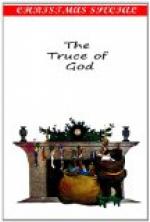MARY ROBERTS RINEHART
Decorations by Harold Sichel
New York
George H. Doran Company
1920
[Illustration: “Softly,” he said ... “No harsh words.”]
[Illustration]
[Illustration: Chapter One]
The Truce of God
I
Now the day of the birth of our Lord dawned that year grey and dreary, and a Saturday. But, despite the weather, in the town at the foot of the hill there was rejoicing, as befitted so great a festival. The day before a fat steer had been driven to the public square and there dressed and trussed for the roasting. The light of morning falling on his carcass revealed around it great heaps of fruits and vegetables. For the year had been prosperous.
But the young overlord sulked in his castle at the cliff top, and bit his nails. From Thursday evening of each week to the morning of Monday, Mother Church had decreed peace, a Truce of God. Three full days out of each week his men-at-arms polished their weapons and grew fat. Three full days out of each week his grudge against his cousin, Philip of the Black Beard, must feed on itself.
His dark mood irritated the Bishop of Tours, who had come to speak of certain scandalous things which had come to his ears. Charles heard him through.
“She took refuge with him,” he said violently, when the Bishop had finished. “She knew what hate there was between us, yet she took refuge with him.”
“The question is,” said the Bishop mildly, “why she should have been driven to refuge. A gentle lady, a faithful wife—”
“Deus!” The young seigneur clapped a fist on the table. “You know well the reason. A barren woman!”
“She had borne you a daughter.”
But Charles was far gone in rage and out of hand. The Bishop took his offended ears to bed, and left him to sit alone by the dying fire, with bitterness for company.
Came into the courtyard at midnight the Christmas singers from the town; the blacksmith rolling a great bass, the crockery-seller who sang falsetto, and a fool of the village who had slept overnight in a manger on the holy eve a year before and had brought from it, not wit, but a voice from Heaven. A miracle of miracles.
The men-at-arms in the courtyard stood back to give them space. They sang with eyes upturned, with full-throated vigour, albeit a bit warily, with an anxious glance now and then toward those windows beyond which the young lord sulked by the fire.
“The Light of Light
Divine,
True Brightness undefiled.
He bears for us the shame
of sin,
A holy, spotless Child.”
They sang to the frosty air.
When neither money nor burning fagot was flung from the window they watched, they took their departure, relieved if unrewarded.




